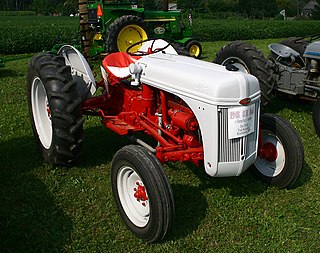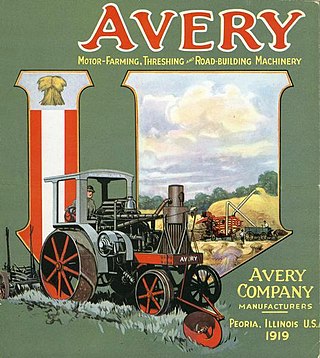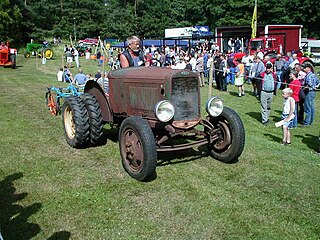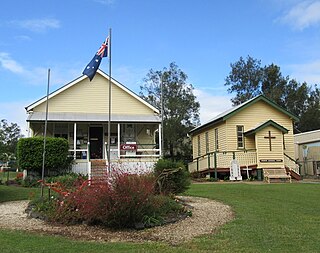Related Research Articles

Lanesville is a town in Franklin Township, Harrison County, Indiana, United States. The population was 935 at the 2010 census.

A tractor is an engineering vehicle specifically designed to deliver a high tractive effort at slow speeds, for the purposes of hauling a trailer or machinery such as that used in agriculture, mining or construction. Most commonly, the term is used to describe a farm vehicle that provides the power and traction to mechanize agricultural tasks, especially tillage, and now many more. Agricultural implements may be towed behind or mounted on the tractor, and the tractor may also provide a source of power if the implement is mechanised.

Deere & Company, doing business as John Deere, is an American corporation that manufactures agricultural machinery, heavy equipment, forestry machinery, diesel engines, drivetrains used in heavy equipment and lawn care equipment. It also provides financial services and other related activities.
The Brampton Fall Fair is an annual agricultural and entertainment event in Brampton, Ontario. It features agricultural displays, animals, 4H events, a midway, entertainment, demolition derby, and a Homecraft exhibit.

Steam-Era is a festival held every Labour Day Weekend in the Town of Milton, Ontario featuring historic steam tractors. Well known for its eye on the past, the community annually celebrates the Milton Steam Era — populated by hundreds of steam-powered tractors, engines, and farm implements converging to salute a bygone era. Traditionally Milton's Steam Era has also featured a parade of steam tractors down Main St.

A steam tractor is a tractor powered by a steam engine which is used for pulling.

The Avery Company, founded by Robert Hanneman Avery, was an American farm tractor manufacturer famed for its undermounted engine which resembled a railroad engine more than a conventional farm steam engine. Avery founded the farm implement business after the Civil War. His company built a large line of products, including steam engines, beginning in 1891. The company started with a return flue design and later adapted the undermount style, including a bulldog design on the smokebox door. Their design was well received by farmers in central Illinois. They expanded their market nationwide and overseas until the 1920s, when they failed to innovate and the company faltered. They manufactured trucks for a period of time, and then automobiles. until they finally succumbed to an agricultural crisis and the Depression.

Powerland Heritage Park, formerly known as Antique Powerland, is a collection of museums and a self-described heritage site for power equipment, such as farm machinery, commercial trucks, trains, trolleys, construction equipment, logging equipment, and the engines which power them. It is located in Brooks, Oregon, United States, and is operated by the non-profit Antique Powerland Museum Association (APMA). It was initially established by a group of enthusiasts "dedicated to the preservation, restoration and demonstration of steam powered equipment, antique farm machinery and implements."

Two-wheel tractor or walking tractor are generic terms understood in the US and in parts of Europe to represent a single-axle tractor, which is a tractor with one axle, self-powered and self-propelled, which can pull and power various farm implements such as a trailer, cultivator or harrow, a plough, or various seeders and harvesters. The operator usually walks behind it or rides the implement being towed. Similar terms are mistakenly applied to the household rotary tiller or power tiller; although these may be wheeled and/or self-propelled, they are not tailored for towing implements. A two-wheeled tractor specializes in pulling any of numerous types of implements, whereas rotary tillers specialize in soil tillage with their dedicated digging tools. This article concerns two-wheeled tractors as distinguished from such tillers.

The Central North Dakota Steam Thresher's Reunion is an annual event held in New Rockford, North Dakota every third weekend of September. The event is held on the New Rockford Fairground, and began in 1958. It features rare working steam engines, antique implements, and also many antique tractors. Admission also includes a visit to the on-site pioneer village. The festival has run for nearly fifty years and has led to New Rockford self-proclaiming itself "Steam Capitol of North Dakota".

The U.S. state of Indiana first required its residents to register their motor vehicles in 1905. Registrants provided their own license plates for display until July 1, 1913, when the state began to issue plates.
Cockshutt was a large agricultural machinery manufacturer, known as Cockshutt Farm Equipment Limited (1957–1962), based in Brantford, Ontario, Canada.
Belt Pulley was a U.S.-based magazine dedicated to antique farm tractors of all brands and makes. It published successfully for over 2 decades and was one of the best known titles in the category. It was a family business run first by the Aumann family and then by the Elmore family. In 2009 it was sold, and the new owner eventually changed the name of the publication to Vintage Tractor Digest. This ended its publication under the Belt Pulley title.

The Oliver Farm Equipment Company was an American farm equipment manufacturer from the 20th century. It was formed as a result of a 1929 merger of four companies: the American Seeding Machine Company of Richmond, Indiana; Oliver Chilled Plow Works of South Bend, Indiana; Hart-Parr Tractor Company of Charles City, Iowa; and Nichols and Shepard Company of Battle Creek, Michigan.
The Plainsman Museum is a museum located in Aurora, Nebraska, focusing on the history of the settlers and their descendants in the central Nebraska plains region. It was officially dedicated on July 4, 1976, as a part of the American national bicentennial, and consists of a complex of buildings housing various items demonstrating the everyday life of the plains settlers, along with agricultural history.

Doodlebug tractor is the colloquial American English name for a tractor home-made in the United States during World War II, when production tractors were in short supply. The doodlebug of the 1940s was usually based on a 1920s or 1930s era Ford automobile which was then modified either by the complete removal or alteration of some of the vehicle body. The preservation of examples of the doodlebug tractor has become popular in New England and upstate New York where there are several clubs holding monthly meet-ups in the summer months to put their contraptions to the test by pulling large stone boats in a tractor pull.
The National Threshers Association (NTA) is a non-profit group of enthusiasts who are interested in steam-powered traction engines - also known as "steam tractors", "steam traction engines" or simply "steam engines" - as well as related equipment. The group's premier event is its annual reunion/show, which features live exhibits of antique steam engines and gas-powered machinery from throughout the United States and Canada. Dating back to 1944, the annual show is recognized as the oldest event of its type in the United States.

Heritage Farm Museum and Village is an open-air living history museum in Huntington, West Virginia that focuses on Appalachian history and culture. Originally conceived as a location to house and display the private collection of A. Michael "Mike" and Henriella Perry, Heritage Farm has expanded into an entire Appalachian Frontier Village that was recently named West Virginia's first Smithsonian-affiliated museum.

The Laidley Pioneer Village & Museum is an historic open-air museum located in the town of Laidley, Lockyer Valley Region, Queensland, Australia, on the corner of Drayton Street and Pioneer Street. It portraits rural life in Queensland from the early 19th century.
References
- ↑ STEWART, STAFF PHOTO BY TYLER. "PHOTO: Enjoying Lanesville Heritage Weekend". News and Tribune. Retrieved 2018-02-07.
- ↑ "Lanesville celebrates Indiana farming heritage". The Courier-Journal. Retrieved 2018-02-07.
- ↑ "Classic farm life celebrated at the Lanesville Heritage Weekend" . Retrieved 2018-02-07.
- ↑ "70K expected at 41st festival". The Courier-Journal. 10 September 2016. ProQuest 1818062019.
- 1 2 Hall, Christopher (12 September 2005). "Headline: Tradition keeps crowds strong at Lanesville fest". The Courier-Journal. ProQuest 241321505.
- ↑ "In S. Indiana, it's start your steam engines!". The Courier-Journal. Retrieved 2018-02-07.
- ↑ Esarey, Jenna (12 September 2014). "Lanesville celebrates Indiana farming heritage". The Courier-Journal . Retrieved 4 April 2018.